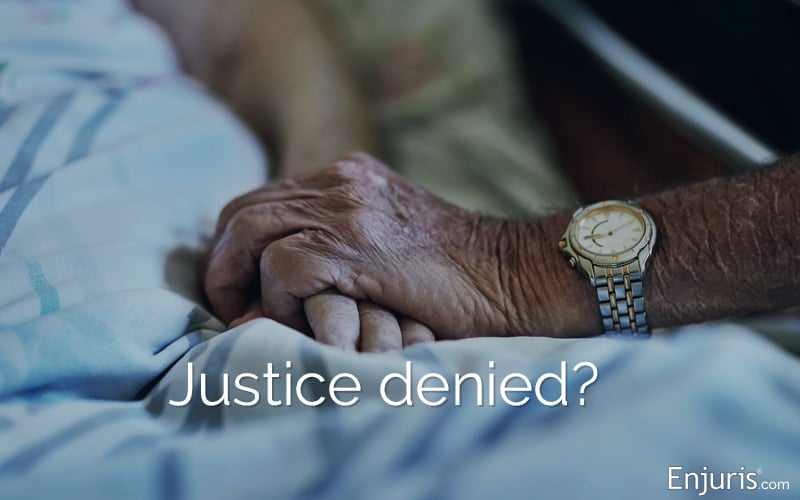[ad_1]

More than a year after the Florida Department of Health charged her father’s doctor with medical malpractice, Sabrina Davis, a 30-year-old Florida resident, still hasn’t been adequately compensated.
The reason?
Florida’s so-called “free-kill” law.
Unfortunately, Sabrina’s experience is all too common. In this blog post, we’ll take a close look at this restrictive law, and we’ll explain whether there is an alternative way to seek compensation.
What is Florida’s “free-kill” law?
Florida Statute 768.21(8) is referred to by critics as Florida’s “free-kill” law. Here’s the relevant section of law:
“The damages specified in [768.21(3)] shall not be recoverable by adult children and the damages specified in [768.21(4)] shall not be recoverable by parents of an adult child with respect to claims for medical negligence as defined by section 766.106(1).”
Okay, now let’s make sense of this law.
The first thing to understand is that when a loved one is killed in Florida due to someone’s carelessness or wrongful act, surviving family members (spouse, children, parents, and, when at least partly dependent on the decedent for support, any blood relatives and adoptive brothers and sisters) can typically recover the following damages:
Florida’s “free-kill” law says that, in medical malpractice cases, adult survivors are not permitted to recover pain and suffering damages or loss of companionship damages for their loss of a loved one. If the victim died due to any other form of negligence, such as a car crash, these damages would be available.
Let’s look at a hypothetical to further illustrate this law.
Jane, a 50-year-old single mother in Florida, visited her local hospital for a routine surgery. Tragically, due to a medical error during the procedure, Jane did not survive.
Jane’s two children, David and Lisa, both in their mid-20s, were devastated by their mother’s sudden passing. In addition to their grief, they were shocked to discover the medical negligence that caused Jane’s untimely death. Wanting to hold the hospital accountable and recover damages for the loss of their mother’s companionship, guidance, and the pain and suffering they’ve endured due to her loss, they consulted an attorney.
However, under Florida Statute 768.21(8), their attorney informed them that, because Jane’s death was due to medical malpractice, David and Lisa, being adult children, could not recover damages for their pain and suffering or loss of companionship. Had their mother died in a car accident or any other form of negligence, they could have sought damages for their losses.
The law allowed them to only recover for any medical or funeral expenses they might have paid on their mother’s behalf. For David and Lisa, this meant that the emotional toll of their mother’s wrongful death at the hands of medical professionals could not be legally recognized in the way other accidental deaths would be.
What is the purpose of Florida’s “free-kill” law?
Florida’s controversial law was passed in 1990. The intention of the law was to prevent frivolous lawsuits, lower insurance costs, and prevent physicians from leaving the state.
The law undoubtedly benefits physicians. But opponents have argued for years that the law prevents families from seeking justice.
The latest attempt to repeal the law (SB 690) died in the judiciary on May 5, 2023.
Florida is the only state in the country to have an age limit in wrongful death cases based on medical malpractice.
Filing a wrongful death lawsuit in Florida
Florida’s so-called “free-kill” law, under Florida Statute 768.21(8), has sparked concern and confusion for many families who tragically lost a loved one due to potential medical negligence. At first glance, it might seem that certain family members are entirely barred from recovering damages in these cases. However, it’s important not to jump to this conclusion without speaking to an attorney about your unique case.
One important thing to remember is that not all medical-related deaths qualify as “medical malpractice” under the law. There are instances where a death in a medical setting might be due to other forms of negligence or even intentional acts that do not fall under the restrictive scope of medical malpractice. For instance, if a hospital’s maintenance staff fails to repair a faulty electrical outlet, leading to a patient’s death by electrocution, this might not be considered medical malpractice, even if it occurred within a medical facility.
Given these complexities, it’s vital for anyone facing the devastating loss of a loved one in a medical setting to consult with an experienced Florida attorney. A skilled attorney can evaluate the specifics of your situation and advise on the best path forward.
[ad_2]



